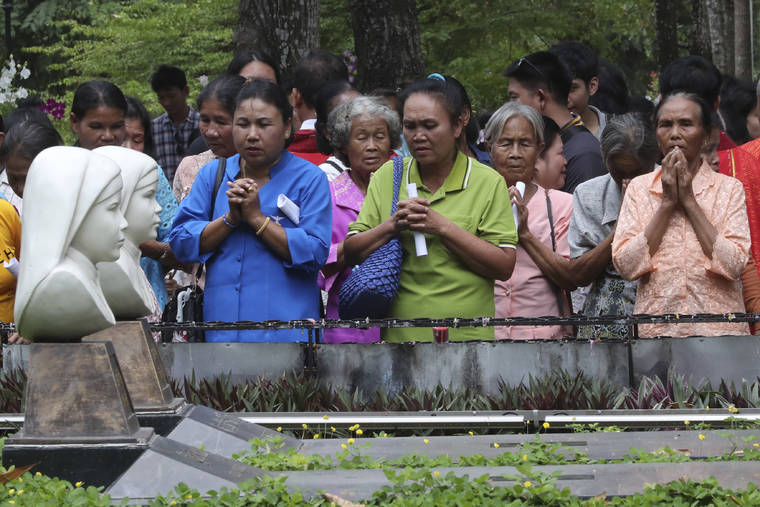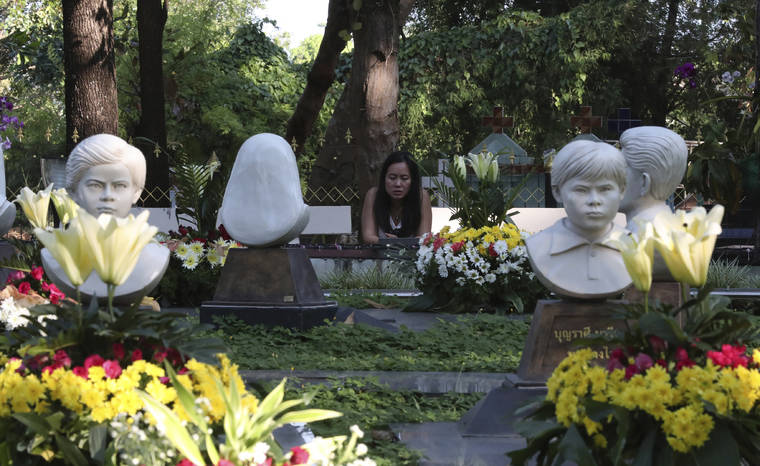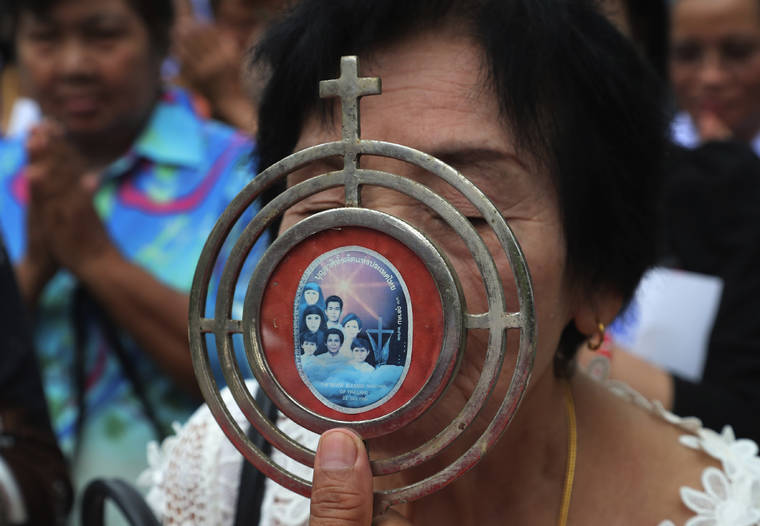SONGKHON, Thailand — When Pope Francis makes his first trip to Thailand this week, he will be visiting a country that welcomed Roman Catholic missionaries more than five centuries ago and whose Buddhist population remains strikingly tolerant of other religious beliefs. But in 1940, as militarism and xenophobia were haunting the world, seven Catholic villagers in remote northeastern Thailand were executed for refusing to renounce their religion.
The “Seven Martyrs” were beatified by Pope John Paul II in 1989, making them eligible for eventual sainthood. They were the first Thais to be given the honor by the Vatican. The date of their beatification, Oct. 22, is marked annually in this village where they died, where there is a shrine and educational center for Catholics that is a regional landmark.
“For our history, we should not repeat the bad part but we should use it as a lesson, to move on, to build a new religious history, to bring all Thais together as brothers and sisters,” the Rev. Prayoon Phongphit, chancellor of the region’s archdiocese, said at this year’s ceremony.
The little-known story of the seven martyrs is more a political than religious tale.
They were victims of a tide of nationalism, an opportunistic policy implemented by Thailand’s then-dictator to avenge slights from Western powers while modernizing the country on a Western model. The Western model it most closely resembled was Mussolini’s fascist Italy.
Thailand fended off being colonized by placating the neighboring colonial powers, Britain and France, with territorial and economic concessions. France whittled away at territory Thailand considered its own, annexing it to its French Indochina colonies of Laos and Cambodia.
Plaek Phibunsongkhram was one of the Thai army officers who in 1932 staged a revolution ousting an absolute monarch with the aim of modernizing the country. In 1938, he became prime minister and promoted the sort of ultranationalism then seen in Italy and Nazi Germany, seeking to expunge minority cultures with their languages and religions and unite all behind loyalty to king and nation and one religion, Buddhism.
Phibunsongkhram’s rise coincided with Japan’s military drive to build a Great East Asia empire. The Japanese promoted Asian chauvinism, an appeal to the people in British, French and Dutch colonies to throw off the yoke of their Western oppressors.
Events elsewhere, meanwhile, suggested that nationalistic strongman rule was the wave of the future, as the army of Japanese ally Germany overran most of Europe.
An emboldened Phibunsongkhram had Thailand attack the demoralized French forces in Laos and Cambodia in a bid to regain what he considered lost Thai territories.
To whip up support for the war, all things French were painted as threatening. Inside Thailand, French missionaries — and their churches and followers — were looked upon as the enemy within. Propaganda and policy were both used to try to purge the Catholic presence, mainly by forcing conversions to Buddhism and shuttering church properties.
“Catholics were the perfect symbol of imperialism and antithesis of national identity due to their association with France, their history of political intervention, and the fact that many converts were ethnic minorities,” Shane Strate, a history professor at Kent State University in the United States, wrote in a paper about the era.
Songkhon village in Mukdahan province, 550 kilometers (340 miles) northeast of Bangkok, was one of several Catholic settlements in the area. With a population of 500-600, it had a church, a church school, a French parish priest and two sisters from a convent in Laos, which lies just across the Mekong River from the province.
Six policemen were deployed to the village after Thailand attacked French Indochina in November 1940, and the officer in charge , Boonlue Muangkote, enforced the new nationalist order avidly. As villagers were pressured to renounce their Catholic faith and embrace Buddhism, the French priest, Father Paul Fige, was deported to Laos.
Boonlue pressed his campaign, apparently assuming the absence of their priest would break the villagers’ will. But Philip Siphong Onphitak, the village religious teacher, or catechist, assumed leadership of his flock, keeping up resistance until Dec. 16, when he was murdered in the jungle, reportedly by Boonlue.
Two sisters from the Lovers of the Holy Cross Congregation, Agnes Phila and Lucia Khambang, then took over the leadership, defying Boonlue’s increasingly strident demands to convert. After they failed to yield during a Dec. 22 showdown, they decided they were ready to die for their faith.
On Christmas night, Sister Agnes wrote a letter to Boonlue declaring their intention and calling on him to carry out his threats and “open the door to heaven to us.”
After the letter was delivered the next day, Boonlue had the sisters and a handful of devotees marched over to a cemetery, where they were shot. The dead included 59-year-old Agatha Phutta and three teenage girls: Cecilia Butsi, Bibiana Khampai and Maria Phon.
Boonlue was transferred in June 1941, but only in 1944, when the tide of war began to turn against Japan and Prime Minister Phibunsongkhram was forced to step down, was the persecution of Catholics halted.
At this year’s commemoration of the beatification, Rev. Prayoon read from Sister Agnes’s defiant letter in front of hundreds of the faithful.
“We are asking you to carry out your order with us. Please do not delay any longer. Please carry out your order. We are ready to return our lives to God who has given us our lives. We will not allow ourselves to be victims of devils and ghosts,” it said.
The crowd then moved to the cemetery, where statues of the martyrs are in a garden shaded by tall trees.
“We are so blessed. We are celebrating the 30th anniversary of the beatification here and Thailand will receive the pope’s visit. I am so proud,” said Elizabeth Boonsong Sitthi, a 62-year-old resident of neighboring Sakon Nakhon province who attends the ceremony almost every year and plans to be in the Thai capital Bangkok for Pope Francis’s events.
———
Peck reported from Bangkok.




